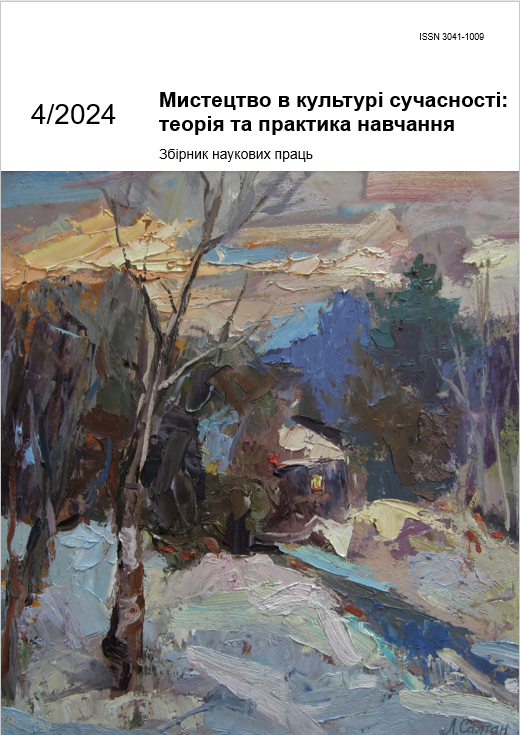PRINCIPLES OF VOICE DEVELOPMENT IN THE TEACHING METHOD OF BERTRAM BEYER IN THE ACADEMIC VOCAL CLASS: A MUSIC-HISTORICAL ASPECT
Published 2025-01-02
Keywords
- vocal art; vocal technique; musical experience; method of vocal training
Copyright (c) 2024 Світлана Басовська, Наталія Лановенко-Мельник, Тамара Панасюк

This work is licensed under a Creative Commons Attribution 4.0 International License.
How to Cite
Abstract
The article is dedicated to exploring the principles of voice development in Bertram Beier's teaching methodology in the context of academic vocal training and its historical and musical significance. Vocal art, being one of the oldest art forms, has always played a key role in shaping the global musical culture, and the development of the voice as a vocalist’s instrument is directly linked to the process of professional training. Voice setting, technical mastery, timbre development, and the ability to convey the emotional content of a piece are all essential aspects to which modern academic vocal teachers pay attention.
Beier's methodology is highly relevant in contemporary vocal-pedagogical practice, which has undergone significant changes due to the development of musical and theatrical art and the evolution of concert activity at that time in Germany. One of the key features of Beier's approach is his in-depth focus on breathing techniques, with special attention given to the diaphragm's role as the main controller of airflow. This ensures stable support during singing, minimizing tension and fatigue in the vocal apparatus. Beier's proposed breathing technique requires precise air distribution and emphasizes its efficient use, contributing to a natural sound and preventing excessive strain on the vocal cords. This highlights the importance of developing correct breathing habits from the early stages of training. Additionally, Beier focused heavily on working with resonators, which enhance sound and provide brightness without extra effort. This also promotes evenness of sound across all vocal registers. His method involves detailed work on combining resonators with breathing techniques, allowing for flexibility and freedom in performance. A significant innovation in his methodology is the approach to relieving muscle tension, which ensures ease and effortlessness during the performance of complex vocal parts.
Beier's approaches to voice training can be considered innovative, as he emphasized naturalness and organic singing, which contrasted with traditional classical methods where voice work was often mechanical. This approach, based on the performer’s physiological characteristics, laid the foundation for modern vocal pedagogy, which aims to individualize the learning process.
The article compares Beier's methodological approaches with other well-known vocal-pedagogical systems, allowing for a deeper understanding of his influence on the modern vocal school and the new challenges facing today's vocal teachers in seeking the most effective methods for developing their students' singing technique.
Downloads
References
- Берлізова І.В. Принципи «звільнення голосу» К.Лінклейтера у класі академічного вокалу : музично-історичний аспект. Музичне мистецтво і культура. 2020. Випуск 30 книга 2. 372,374 С. DOI https://doi.org/10.31723/2524-0447-2020-30-2-27
- Формування комунікативної компетентності майбутніх учителів музичного мистецтва : монографія/ Василевська-Скупа Л.П. Вінниця: ТОВ фірма «Планер», 2014. 45С.
- Верещагіна-Білявська О.Є. Антропологізація фахової підготовки музиканта: рефлексії на тему. Філософія культурно-мистецької освіти.2022. Київ. 58 С.
- Остапчук Л.О. Шляхи професіоналізації української народної пісенної традиції. Актуальні питання гуманітарних наук. 2023.Вип.60,том 2 .109С. DOI: 10.36550/2415-7988-2022-1-204-99-103
- Посікіра-Омельчук Н., Сікорська І., Басовська С.,Батазова . Відображення історичних контекстів у сучасному музичному мистецтві. Мультидисциплінарні огляди , 2024, 7 (спеціальний випуск), ( Scopus) https://doi.org/10.31893/multirev.2024spe048
- Історія вокального мистецтва: монографія / Шуляр О.Д. Івано-Франківськ: Інститут мистецтв Прикарпатського національного університету ім. В.Стефаника, 2014( 1 -393 С.)
- Соболєва О. Д. Формування вокально-виконавських якостей на заняттях вокалу. Традиції та новації у вищій архітнетурно-художній освіті. Комунальний заклад «Харківська гуманітарно-педагогічна академія» Харківської обласної ради, 2015. Вип.1 ( 46-50 С.)
- Прядко О.М. Формування навичок співацького дихання у майбутніх музикантів на заняттях з вокалу. Педагогічна освіта: теорія і практика. Кам’ янець-Подільський університет імені Івана Огієнка, 2013.Вип 15 ( 225-230 С.)




